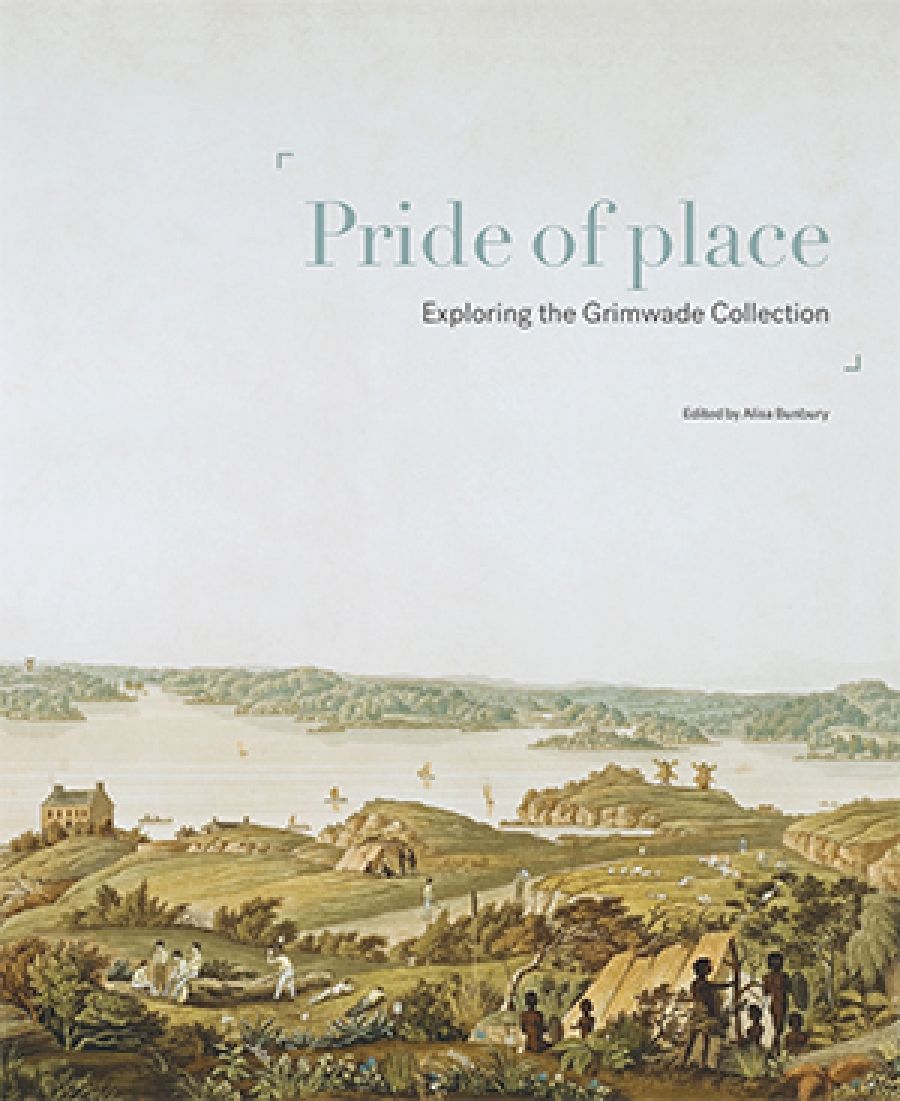
- Free Article: No
- Contents Category: Art
- Review Article: Yes
- Article Title: Shared interests
- Article Subtitle: Russell and Mabel Grimwade’s legacy
- Online Only: No
- Custom Highlight Text:
Pride of Place describes in detail a selection of the outstanding collection of Australian books, paintings, photographs, and prints that Russell and Mabel Grimwade donated to the University of Melbourne. The main focus is on Russell, but they were clearly a team with shared interests in Australian native trees and plants and the European history of Australia.
- Featured Image (400px * 250px):

- Alt Tag (Featured Image): John Arnold reviews 'Pride of Place: Exploring the Grimwade Collection' edited by Alisa Bunbury
- Book 1 Title: Pride of Place
- Book 1 Subtitle: Exploring the Grimwade Collection
- Book 1 Biblio: The Miegunyah Press/Potter Museum of Art, $59.95 hb, 282 pp
- Book 1 Readings Link: booktopia.kh4ffx.net/e4qoQX
Grimwade attended Melbourne Grammar and then studied science at the University of Melbourne, graduating in 1901. In October 1909, he married Mabel Kelly, always known as ‘Mab’. A year later, he bought Miegunyah in Armadale as a wedding present for his wife. At Miegunyah and their country property near Hastings, they planted notable gardens.
In addition to managing with his two brothers the expanding family businesses, Russell Grimwade’s talents and other interests were wide. He served on numerous educational and cultural committees, travelled widely, and was a skilful amateur photographer. An early conservationist, he campaigned for the preservation of Australian forests. Using native timbers, he was a skilled woodworker and cabinetmaker. His home workshop became a crutch factory during World War II, producing more than 3,000 pairs based on an improved design by Grimwade.
Knighted in 1952, Grimwade died in 1955. Mab lived on at Miegunyah until her own death in 1973. The childless couple had decided to leave their Australiana collection, Miegunyah, and a substantial endowment to the University of Melbourne. Russell had hoped that the Armadale house would become the home of Melbourne University Press, complete with its own printery. This proved not to be feasible, and when the university found it was unable to both maintain and use the house effectively, a court order allowed it to be sold in 1987, with the funds being added to the Miegunyah bequest.
Paying tribute to the spirit of the Grimwades’ wishes, part of the funds from the sale were used by Melbourne University Press to establish its Miegunyah imprint. The funding support allows the Miegunyah titles to be produced at a higher quality than normal publishing dictates would allow.
Pride of Place is no. 193 in the second series of Miegunyah publications. It is a beautifully produced coffee-table book with an abundance of full-page colour and black-and-white illustrations and even some fold-outs, including one of the Grimwades’ most notable paintings, William Strutt’s Bushrangers, Victoria, Australia, 1852 (1887). Seventy-six items are described in five sections: ‘Southern Seas’; ‘The First Colonies’; ‘Besides the Birrarung’; ‘Crossing Country’; and ‘Botany and Benefits’. In addition to editing the book, Alisa Bunbury, curator of the Grimwade Collection, provides an introduction to the two donors and their collection. She also wrote almost half of the entries, with the others being by some thirty-eight contributors, many with links to Melbourne University.
The book can be read in two ways. It can be dipped into for the illustrations. But the accompanying text places the described items in the context of their time and considers how they can be read, used, and interpreted by historians and scholars today. This is particularly so in relation to Country and the images featuring the First Australians. This is one of the strengths of the book. One looks at a particular print or drawing, reads the accompanying text, and then looks at the image again with a more critical and understanding eye.
One major artefact that was not part of the Miegunyah donation to the University of Melbourne but that is rightly discussed in Pride of Place was Grimwade’s gift of Captain Cook’s Cottage to the people of Victoria, as part of the state’s centenary celebrations in 1934. Chris Healy gives a succinct account of this generous and, in today’s context, extraordinary gift. The question that is surely asked by people today when they see the quaint building in the Fitzroy Gardens is: why is it there? Those with a basic historical knowledge would know that Cook’s links to Victoria were minimal. In addition, his association with the cottage was equally tangential. It was his parents’ home, and it is unknown whether Cook ever visited them there.
So why did Russell Grimwade buy the cottage, have it dismantled brick by brick with each one carefully numbered, ship them to all to Victoria, and then organise for the cottage to be re-erected in the Fitzroy Gardens as Cooks’ Cottage? The reasons have to do with Grimwade’s collecting philosophy, his civic-minded philanthropy, and the general public consensus on what a historical monument was, something that is much contested today. Grimwade’s Australiana collection was based on the concept of the progress of European settlement in Australia and the documentary record of that progress. His books, many described here, included Cook’s journals of his three voyages, accounts of European discoveries, exploration, and settlement of the Australian continent, and most nineteenth-century accounts of the new colony of Victoria. Grimwade was also a proud Victorian and one suspects that he did not want the cottage to end up in New South Wales, whose sesquicentenary was only four years away.
Born into wealth, the Grimwades lived a luxurious life by any standards, but they were also generous benefactors contributing their money, time, and influence to numerous Melbourne cultural and educational institutions. This book pays them due tribute. And with its subsidised price through the Miegunyah Fund, it is both a bargain and an ideal gift.


Comments powered by CComment